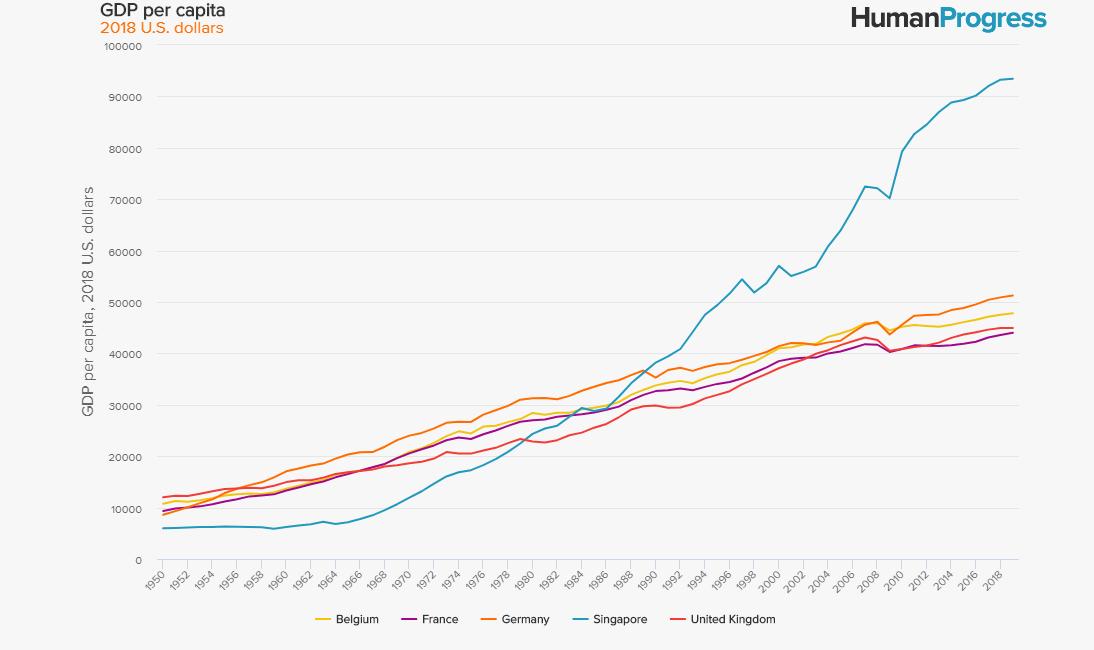I was a big fan of Brexit (the United Kingdom voting to leave the European Union), but I’m very disappointed about the subsequent failure to create “Singapore-on-Thames.”
The above clip was my “under-reported story of the week,” as part of the most-recent episode of the Square Circle.
The main argument for Brexit was to escape the European Union, which is destined to become a “transfer union.”
To be more specific, the combination of demographic decline and fiscal decay means the bureaucrats and politicians in Brussels eventually will obtain the power to impose taxes in order to redistribute money to failed economies in places such as Italy and Greece.
Indeed, that process already is underway.
By voting for Brexit, the people of the United Kingdom can escape the sinking ship and thus will not be forced to subsidize the bad policy of other nations.
But there was a second reason to support Brexit, which was to give the U.K. the leeway to become the Singapore of Europe.
Would that be a good outcome? Assuming the goal is more prosperity, the answer unambiguously is yes.

As you can see from the chart, Singapore easily has eclipsed the major countries of Europe.
And the idea that the U.K. might copy Singapore’s pro-market policies has been a big part of the Brexit debate, with libertarians and small-government conservatives cheering the possibility and folks on the left dreading that potential outcome.
Any search engine will find thousands of stories about this topic. Here’s a tiny sampling to give readers a flavor.

Sadly, my friends on the left did not need to worry about the U.K. becoming an outpost of laissez-faire policy.
Boris Johnson won a landslide victory in 2019 by promising the “get Brexit done,” but he then proceeded to raise taxes and expand the burden of government spending.
So what’s the current state of play?
In a story for the Washington Post, William Booth writes that Brexit has been a failure.
Boris Johnson…is…the man who “got Brexit done.” So how is that going? What can be said about the post-Brexit Britain that Johnson is leaving behind? …Most people don’t think Brexit has delivered on its lofty promises… With “get Brexit done” as his slogan, Johnson led his party to a landslide election victory. …he oversaw Britain’s departure from the union with one of the hardest possible versions of Brexit… But the government has struggled to show the benefits. …it is clear that although Brexit has not sunk the British economy, it has not produced a boom, either.
But the relevant question is why there was not a boom.
The simple answer, as I noted in the above interview, is that there was no effort to create Singapore-on-Thames. Indeed, the supposedly conservative Tories, under Boris Johnson, went in the opposite direction.
And that explains why supporters of economic liberalization are not very happy. Opining for the U.K.-based Telegraph, Allister Heath is rather depressed.
Statist ideology, historical naivety, cowardice and short-termism have crippled our country. Orthodox thinking has turned out to be wrong in almost all areas that matter, from the economy to energy to planning. …The electorate noticed, kicking Labour out and voting for Brexit, but the politicians let them down. Nothing really changed… Ludwig von Mises, in his Critique of Interventionism, explains how social-democracy is an unstable middle point between capitalism and socialism. This is especially true today. All problems, even when caused by failed Left-wing policy, trigger increasingly hysterical demands for even more state action. …We have a Tory government, but the political climate is veering hard-Left.
This brings us back to what I said in the interview. Boris Johnson has been deposed as leader of the Conservative Party.
Now there’s a race between Rishi Sunak and Liz Truss to see who will be the new party leader – and thus the new Prime Minister.
Both of them claim they will move policy back in the right direction. I’m guessing Ms. Truss is the better option, but my main point in the discussion was that the United Kingdom desperately needs another Margaret Thatcher.
———
Image credit: U.S. News & World Report collection at the Library of Congress | Public Domain.



